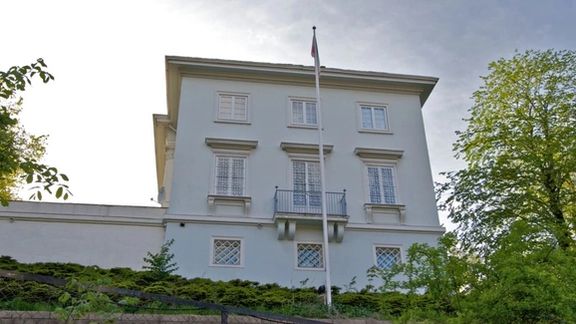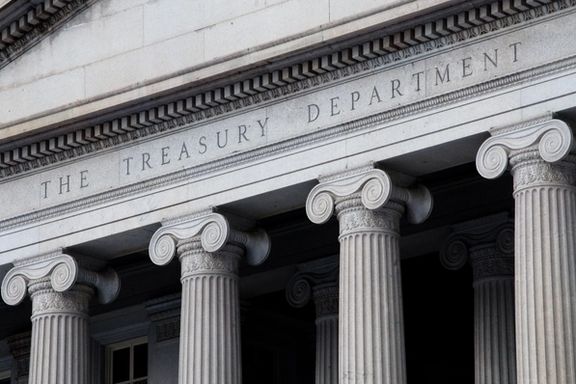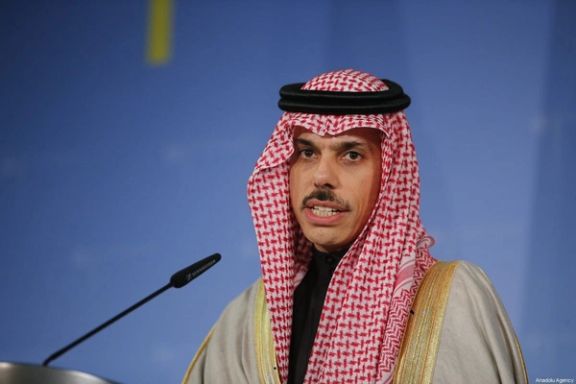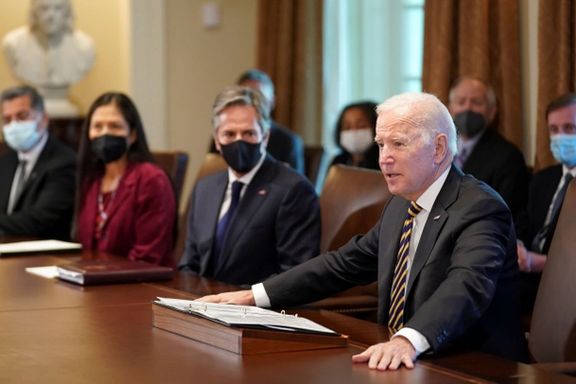Warning Issued Over Heavy Air Pollution In Major Iranian Cities

After a winter weather front passed from central Iran on Friday, the Iranian meteorological agency announced a “yellow” pollution alert for five major cities.

After a winter weather front passed from central Iran on Friday, the Iranian meteorological agency announced a “yellow” pollution alert for five major cities.
Citizens have been warned not the engage in heavy physical activities outdoors in Tehran, Esfahan Mashhad, Karaj and Arak. Vulnerable people have been told to stay indoors.
It is not yet clear if burning of dirty, heavy fuels for electricity generation has led to the heavy pollution, but Iranian officials had warned months ago that with shortages of natural gas, they would resort to using diesel fuels in winter months.
Consumption of gas and electricity increases during cold winter and hot summer days.
Last winter, Iran burned mazut, a type of dirty diesel that polluted many large cities, which led to protests. Tehran and Esfahan were listed in category red during last December-January.
The same energy crisis happened again in June when air-conditioners kicked in raising electricity consumption. Iran has one of the cheapest electricity rates in the world.
Iranian officials said earlier this year that up to 40,000 people die prematurely every year because of air pollution.

Norwegian police have charged a former Iranian diplomat for his alleged role in the 1993 assassination attempt on the publisher of Salman Rushdie’s Satanic Verses.
The Norwegian state broadcaster NRK reported Friday that a senior former Iranian envoy and a Lebanese man were charged over the attempt to kill Nygaard in Oslo.
William Nygaard published the Satanic Verses, a bestseller written by British-Indian novelist Salman Rushdie, who was condemned to death in a fatwa of then-Supreme Leader Ruhollah Khomeini of Iran over his portrayal of the Prophet Muhammad.
Nygaar survived three bullets but spent months in hospital. The police at the time suspected personal motives in the attempted murder according to the New York Times, and for years there was no movement in the case although there was speculation that the attack was politically or religiously motivated. Some sources said the Iranian embassy was always on the police radar.
In October 2018, the Norwegian police announced their intention to file charges against two suspects, but no names or clues were provided.
Iranian journalist Kambiz Ghafouri, who lives abroad, tweeted Saturday that the former diplomat is Mohammad Nik-Khah, who was first secretary of the Iranian embassy in Norway in 1993. Nik-Khah is most probably in Iran. The Iranian embassy at the time announced that the first secretary, who had been in Norway since 1989, had left the country a few days before the attack on Nygaard.
The case now will remain open for another 30 years.
The Norwegian publisher was not the only one targeted over the Satanic Verses, which provoked widespread anger in the Islamic World. In February 1989, six protestors were killed in an attack on the American Cultural Center in Islamabad, Pakistan.
Ettore Capriolo, the Italian publisher of the book, survived a stabbing, but Hitoshi Igarashi, the Japanese translator, was stabbed to death in July 1991.
Iran has been implicated in many assassinations, kidnappings and terror attacks abroad against dissidents and opponents. Several senior Iranian officials have been indicted over various attacks, most controversially over the 1994 bombing of a Jewish community center in Argentina.
In recent years, Assadollah Assadi, an Iranian diplomat based in Austria, was sentenced to 20-years jail in Belgium in February for involvement in plot to bomb a rally in France of the opposition Mujahedin Khalq Organization in France. Assadi had been arrested by German police.

After a claim Friday that $3.5 billion of Iran's frozen funds had been freed, an IRGC newspaper bumped the figure to $4 billion, as a sign of Tehran's victory.
Neither the CEO of government news agency IRNA who had made the initial claim, nor Javan newspaper affiliated with the Revolutionary Guard presented any evidence or quoted an official source to back-up their claims. There have been no foreign official or media reports indicating that the United States has agreed with release of Iranian frozen funds.
An editorial Saturday in Javan said that within 100 days of Raisi taking office, not only had $4 billion been freed "without much negotiation” but also the "capacity of Iran's nuclear program has been growing.”
The paper contrasted these events with the two-year negotiations leading to the 2015 nuclear deal, the JCPOA (Joint Comprehensive Plan of Action), and with the failure of previous president Hassan Rouhani to secure the release of Iranian funds frozen by third parties wary of punitive United States action under its ‘maximum pressure’ sanctions threatening anyone buying Iran’s oil or dealing with its financial sector.
In a dig at Rouhani, whose strategy of deepening economic ties with Europe was thwarted by ‘maximum pressure,’ Javan noted that “sometimes not being eager to negotiate, particularly with Westers powers, produces better results.”
In a tweet Friday the CEO of the government official news agency (IRNA), Ali Naderi, said $3.5 billion of Tehran's frozen funds had been released. Naderi did not say where the assets were frozen but claimed they could soon be used for “trade,” presumably implying they might pay for exports to Iran rather than be transferred as cash.
Javan added $500 million to this figure on the grounds, it said, that the United Kingdom had finally agreed to pay a four-decade-old debt of £400m ($535m) owed Iran for weapons bought in the 1970s but never delivered.
The newspaper linked the release of frozen funds and Britain honoring the debt to the resumption of Vienna talks at the end of November on reviving the JCPOA. The pavements would give “a different perspective to the Vienna process," it said.
Iran has assets frozen in several countries including South Korea and Japan, largely for past purchases of Iranian oil, as well as in Iraq, India, and China. It was reported this week that China imported on average 560,000 barrels per day(bpd) of Iranian oil from the beginning of August until the end of October, but other Asian customers stopped buying it under US pressure.
$50 billion frozen
The semi-official Iranian Students News Agency (ISNA) in a report Saturday said Iran's assets frozen abroad amounted to $50 billion, including $8 billion in South Korea, $3 billion in Japan, and $6 billion in Iraq.
The ISNA report said that suddenly injecting all these assets into the forex market would push the exchange rate for the dollar to 150,000 rials or less. Nonetheless, the rial fell by 1,900 to 285,300 against the US dollar in the unofficial market Thursday.
Iranian officials have repeatedly made claims of the looming release of frozen funds, from Iraq in March for instance, but have not subsequently confirmed the transfer of money.
Last week South Korea’s Yonhap news agency wrote after Korea's first vice minister for foreign affairs, Choi Jong-kun, talked by phone with the US special envoy for Iran, Robert Malley, that Seoul and Washington maintained communication over Iran, especially on Iranian assets locked in South Korean banks, which it put at $7 billion.

Exploratory talks with Iran have been cordial but not substantive, Saudi Arabia’s foreign minister has told France-24 in an interview published on Saturday.
“We are committed to a substantive discussion with Iran on addressing concerns that we and other countries in the region have…but that would require to address all the concerns that we all have,” Prince Faisal bin Farhan Al Saud said.
He added that although no substantive progress has been achieved in four rounds of talks but, “we have made enough progress that would allow us to move forwards.”
Asked about Saudi concerns over the progress of multilateral talks aimed at reviving the 2015 nuclear deal, known as JCPOA, bin Farhan said that his country has “significant doubts” about where the talks are going. He went on to say that these doubts have been reinforced in recent months by Iran’s nuclear activities. He also said Riyadh is concerned about restrictions on IAEA nuclear monitoring in Iran.
Tehran has accelerated uranium enrichment and has said it now has a stockpile of more than 200 kilograms of 20-percent enriched fissile material and another 25 kg of 60-percent purified uranium. This takes Iran closer to the threshold of having enough 90-percent enriched uranium for a nuclear bomb.

US President Joe Biden said in a memo to his officials on Friday that there were sufficient supplies of oil so other countries can reduce purchases from Iran.
The White House is required to affirm every six months that there is enough oil supply globally to maintain sanctions against Iran that were put in place in 2012, during Barack Obama's administration.
Biden's memo sent to Secretaries of State, Treasury and Energy comes in advance of a virtual meeting with China's President Xi Jinping on Monday, in what is expected to be the leaders' most extensive meeting since Biden took office.
Iranian media reported Biden’s statement amid general pessimism about the outcome of the talks to restore the 2015 nuclear agreement (JCPOA) and have the US sanctions lifted. The government’s news website IRNA, however, was quick in trying to instill optimism quoting a member of parliament’s energy committee on Saturday who said exports have gradually increased in the past few months.
China is the largest purchaser of Iranian oil, averaging purchases of more than 500,000 barrels a day over the last three months.
Chinese purchases of Iranian crude have continued this year despite sanctions that, if enforced, would allow Washington to cut off those who violate them from the US economy.
The Biden administration is currently not enforcing those sanctions ahead of forthcoming negotiations with Iran to revive the JCPOA.
"Consistent with prior determinations, there is a sufficient supply of petroleum and petroleum products from countries other than Iran to permit a significant reduction in the volume of petroleum and petroleum products purchased from Iran by or through foreign financial institutions," Biden said in the memo.
Biden administration diplomatic attempts to enforce the oil sanctions by persuading China to reduce purchases remain confidential, but critics believe the administration has not acted with determination to stop the trade.
Biden’s argument about sufficient oil supplies, however, is not so strong amid prices that have exceeded $80 a barrel. As gasoline prices have been rising in the United States, there is talk this week of the government releasing supplies form the Strategic Petroleum Reserves (SPR).
Almost all of Iran’s oil to China is shipped in illicit ways, with tankers transferring oil on high seas and documents fabricated to show other sources for cargoes. But Iranian officials and government-controlled media have claimed in recent months that Iran has been successful in exporting more oil to China.
No one knows how Chinese importers pay Tehran amid US banking sanctions on Iran but the role of intermediaries in selling cargoes to China and making payments to Iran has been reported. This means Iran is not recouping the full value of its exports.
With reporting by Reuters

Hundreds of residents of Esfahan joined farmers protesting against water shortage and the drying up of the river, Zayandeh Roud, that flows through the city.
Footage aired by state television and social-media posts showed protesters marching in the dry river bed towards the 17th-century Khajou Bridge Friday.
They chanted "Flowing Zayandeh Roud Is Our Indisputable Right," a play on the slogan "Nuclear Energy Is Our Indisputable Right," "We Support Farmers," often chanted at state-sanctioned rallies. "Give Back Our Zayandeh Roud, Give Back Isfahan Its Breath," and "There Will Be Unrest In Esfahan If the River Doesn't Flow," protesters chanted.
Drought and global warning have led to water shortages across the region in recent years, including Syria, Iraq where crop production has been halved, and Saudi Arabia, where King Salman recently asked subjects to pray for rain. In Iran as elsewhere there have been tensions between communities vying for water supply.
But the water crisis has been getting worse in Iran for the past decade because of mismanagement in constructing unnecessary dams, encouraging water-thirsty crops like rice and political influence in water distribution.
Zayandeh Roud – which starts from the Zagros Mountains, whirls through Esfahan and disappears in wetlands east of the city – has been completely dry most of the year for two decades. Esfahani farmers started a new round of protests Monday.
Protesters sleeping in tents pitched in the dry riverbed at night say water “traditionally” allocated to farmers has gone to businesses or to other provinces, and that the Esfahani farmers cannot sow autumn crops, including wheat, while their livestock is damaged.
Ali-Akbar Mehrabian, the energy minister, flew to Esfahan Friday to investigate the situation, with some protestors blaming power industries for using water.
"We have come from east and west to seek what is our right. We are neither thugs and hooligans, nor preying on other's livelihood. We are a group of hardworking farmers with calluses on our hands and bare feet. Our men and women's subsistence depends on farming, " one farmer said in a speech to protesters on Tuesday alluding to often-used accusation of being "thugs and hooligans" brought against protesters by the authorities.
There has been land subsidence in the city and at the city airport due to water scarcity, the farmer said. Photos posted to social media show cracks in the ground around the airport, and hollows and cracks in and around Esfahan’s historical buildings and monuments.
Farmers in Esfahan have held several protests this year despite a warning by Esfahan's Revolutionary Prosecutor's Office on April 24 to avoid rallies without a permit. The prosecutor warned that unlicensed protests risked "misuse" by people with "destructive goals." Khuzestan protests in July over water lasted for nearly two weeks, in which at least 12 people were killed when security forces used force.
Government critics blame the water situation an emphasis on attempts to achieve self-sufficiency in agriculture, including water-intensive crops such as rice and other grains.
Ali Salajegheh, Iran’s representative at Cop26 in Glasgow, Scotland, told the BBC Thursday, that Iran would sign the Paris accords once sanctions were lifted. "Iran has been impacted by climate change like every other place in the world," he said. "This has reduced our rainfall per annum and also the inflow of water into our rivers has reduced by 40 percent this has affected our agriculture and affected our industrial and drinking water."
Iran is the world's eighth largest CO2 emitter yet is one of the few countries not to ratify the 2015 Paris pact.